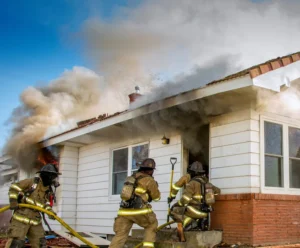Fire insurance is one of those important things that you hope you’ll never need, but luckily it’s very useful when you do. As we head into 2024, renewing your fire insurance does not have to be a difficult task. This guide is designed to simplify the renewal process and ensure you are fully prepared and informed every step of the way.
Read more about fire insurance
definition of fire insurance
Fire insurance is a type of property insurance that covers damage and loss from fire. This policy provides financial protection in the event of a fire by paying for the cost of repairing or replacing damaged property and personal belongings.
Main benefits of fire insurance
The most important benefit of fire insurance is financial security. It protects homeowners, renters and businesses from significant financial losses due to fire. Plus, it gives you peace of mind knowing that you are protected from one of the most devastating events that can occur.
common misunderstandings
Many people think that their standard homeowners insurance policy automatically includes comprehensive fire coverage. While it may cover certain aspects, a specialist fire insurance policy provides broader protection, especially for valuables and rebuilding costs.
Why updates are crucial
continuity of coverage
By renewing your fire insurance, you ensure that there are no gaps in your coverage. Mistakes, even short-lived, can cost you significant financial losses.
Avoid security mistakes
Insurance policies usually have an expiration date. Failure to renew on time could lead to a lapse, meaning you will be unprotected during this period.
Adjust coverage to current needs
The renewal window is a great opportunity to reevaluate your coverage needs. Has your home been renovated? Acquiring more valuable assets? By adjusting your policy, you are fully covered.
Fire insurance changes for 2024
New regulations and policies
A number of new regulations will be introduced in 2024 to strengthen consumer protection and ensure fair practices in the insurance sector. Staying informed about these changes will help you make better decisions during renewal.
skill improved
Technology plays an important role in streamlining the insurance process. From AI-driven customer service to using big data for more accurate risk assessments, these developments are making fire insurance more efficient and user-friendly.
Impact on premiums and coverage
Premiums and coverage options are constantly evolving as new regulations and technologies emerge. Understanding these changes can help you get the best bang for your buck.
Ready to renew
Check your current policy
Please check your current policy in detail before renewing it. Find out what it covers, what the limitations are and what areas you may need more or less coverage.
Assess your coverage needs
Map your current situation. Are there any significant changes to your home or business that could affect your insurance needs? These could be renovations, new purchases or even changes to local areas that could affect fire risk.
Gather the necessary documents
Having all the necessary documents ready can simplify the renewal process. This includes your current policy details, any new valuations of your property or assets, and documentation of any recent changes or upgrades to your property.
Steps to update fire insurance
Contact your insurer
Contact your current insurer well before your policy expires. This will give you plenty of time to discuss your renewal options and make any necessary adjustments.
View and update your information
Make sure all your personal and property information is up to date. Incorrect or outdated information can cause coverage issues or claim denials.
Compare quotes from different providers
It’s always a good idea to shop around. Comparing quotes from different providers can help you find better coverage options and potentially lower your premiums.
Cost-saving tips
Bundling policy
Many insurance companies offer discounts if you bundle multiple policies, such as home insurance and car insurance. This can result in significant cost savings.
Increase deductible
If you are willing to pay higher out-of-pocket costs in the event of a claim, increasing your deductible can lower your premium.
Implement security measures
Installing fire alarms, sprinkler systems and other safety measures does not protect
Adjust your policy
Customize your policy to meet your specific needs. This may include adding additional terms for high-value items, or selecting coverage for replacement costs instead of actual cash value.
Common pitfalls to avoid
drag extension
Don’t wait until the last minute to renew your policy. Delays can lead to coverage errors and hasty decisions that may not be in your best interest.
Ignore policy details
Make sure you read the fine print. Understanding the exclusions, limitations, and conditions of your policy is critical to avoiding surprises during the claims process.
Your home contents insurance is insufficient
Make sure your coverage limits reflect the true value of your property and contents. If you are underinsured, you may incur significant out-of-pocket costs in the event of damage.
Technical tools that are easier to update
Online renewal platform
Many insurance companies now offer online renewal platforms, making the process faster and easier.
Mobile application for policy management
Managing your policy through a mobile app simplifies renewals, claims, and even communication with your provider.
Artificial intelligence and chatbots for customer support
AI-powered chatbots can answer your questions instantly, assist with policy administration and guide you through the renewal process.
The role of insurance agents and brokers
Find a reliable real estate agent
A reliable insurance agent can make a big difference. They can give you personalized advice, help you understand complex terminology and ensure you get the best cover.
Benefits of using a broker
Brokers work with multiple insurance companies to give you a wider range of options. They can help you find the best policy for your needs and budget.
Questions to ask your real estate agent
Ask about coverage options, discounts, claims procedures and any changes to premiums. An informed discussion can help you make better decisions.
legal considerations
Know your rights
Understand your rights as a policyholder. This includes understanding policy terms, coverage limits and the claims process.
comply with local laws
Make sure your policy meets local regulations and requirements. This prevents legal problems and ensures that your insurance is valid.
Submit your claim correctly
Learn the proper procedure for filing a claim. Accurate and timely filing can make the claims process smooth or a frustrating experience.



